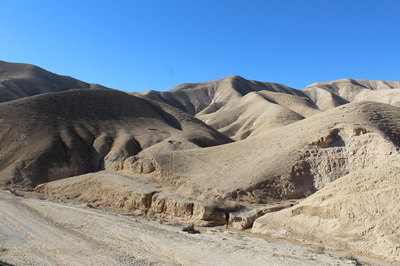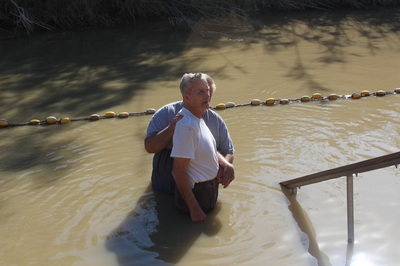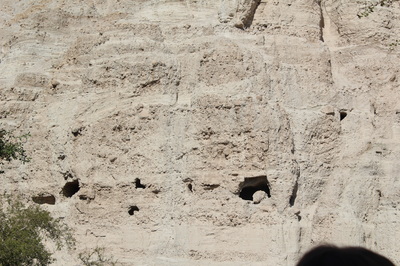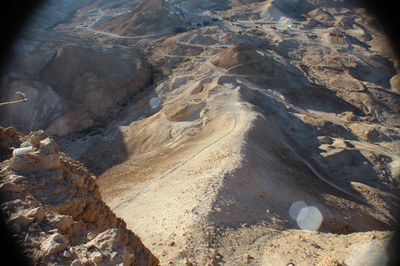|
This morning, we checked out of the Dan Jerusalem Hotel and said goodbye to the Jerusalem portion of our trip. We are beginning the last segment of our trip and heading to the southern end of Israel. Leaving Jerusalem, we headed toward Jericho which is under Palestinian rule even though it is still located within the borders of Israel. Because of that, we were not allowed to go into Jericho...at least not without a lot of paperwork. Our first stop today was the Jordan River baptismal site located at Qasr al-Yahud. This site is one of two recognized for ceremonial baptisms. The Jordan River starts in the far north of Israel, flows in to the Sea of Galilee, and eventually winds up in the Dead Sea. The Jordan River forms part of the southern border with Jordan. This part of the river at the baptismal sight is about 30 feet wide and probably 8 feet deep. They have built wooden steps down into the water to make it safe to walk in to. They also have dressing facilities, and even sell you robes, towels, and whatever else you may need to be baptized. I had the privilege to baptize Dave, Kim, Sandy (Bud's daughter), Nancy (Sandy's cousin), and Bob from South Point, Ohio. The experience was wonderful and everyone had a great time. Without a doubt, this was the coldest water I have ever been in.
As we traveled today, we entered into the Judean Wilderness. Not to be confused with the desert, this wilderness is vast and mostly desolate but a person can live there. Most of the inhabitants are Bedouins. These arabs are nomads living in tents or anything else they can find to provide shelter. For the most part, they are squatters living on land they do not own. These Bedouins are Muslim, typically have at least two wives (Islamic traditions allows for up to four), large families, and take what the land will give them. It was very interesting to see nothing but wilderness and then all of a sudden see a shepherd leading his flock in search of water and food. In some ways, not much has changed in the last 2000 years. Most of the day, we traveled with the Dead Sea on our left and the Judean Wilderness on our right. Once we started to leave the Judean Wilderness, we headed into the Negev Desert. Our first stop in the Negev was at Ein Gedi which is an oasis in the desert. If you remember, David took refuge in Ein Gedi when King Saul was pursuing him. As you read in 1 Samuel 24, King Saul entered the cave where David was hiding and his men urged David to kill the King but David refused because he respected God and in turn he respected Saul. These hills are unbelievably steep and today, you are not allowed to go near the caves. Avi said that to go into the caves, you would have to repel down from the top with a rope. Back in the time of King Saul and David, the topography must have been different to allow access. There are only a few animals that live in such harsh conditions and one is the Hart which is similar to a deer but with large, backward curving horns. As we were leaving, a small herd of 4 or 5 came strolling through the parking lot...way cool. After a short 20 minute drive, we stopped at a place where those who wanted to get their feet wet in the Dead Sea could do so. The Dead Sea is void of life due to its high salinity. The salinity of the Dead Sea is 33.7% whereas the Atlantic Ocean is somewhere between 2-4%. The Dead Sea is at 1,388 feet below sea level making it the lowest point on earth. Israel has found ways to extract many useful minerals from the Dead Sea and its main plant employs over 5000 people which provides jobs in a region that otherwise has few opportunities. Another interesting factoid is that the Dead Sea also has many healing and moisturizing properties to it. Our last stop of the day was Masada. When I was considering making the trip, I looked at the stops listed and put Masada as number one. Naturally, being eight days into the trip, I have had many number ones but I still have a deep personal interest in Masada. When the second temple burned in AD 70, the Jewish remnant that would not surrender to the Romans fled to Masada. There, they had food, water, and shelter to last for years. King Herod had built a palace there and fully stocked everything in case he had to flee. As a side note, King Herod had nine palaces so when you study and read about the palace of King Herod, make sure your study includes knowing which of the nine he was at. Although it was never recorded that he actually stayed at Masada, King Herod had a palace consisting of three stories. The top floor was his ceremonial or "work" floor. The second floor was his residence and the third floor was the patio, pool, and entertainment center. In Ad 72, the Romans laid siege to the mountaintop fortress and in AD 73, after many failures, they built a ramp leading up to the mountaintop. Once they breached the wall, they retired for the night meaning to finish the job the following morning. During that night, the leaders of the Jewish remnant decided that suicide was a better alternative than being captured by the Romans so 960 people committed suicide (most likely by poisoning) and the Romans secured a hollow victory. Two women and five children hid and lived to tell the story. In Israel today, the motto "Masada shall never fall again" stirs passion and pride about ancestors that would not bow...and they will not bow now. We continued on and arrived in Eilat about 8:00 p.m. Eilat is on the Red Sea. In Israel, the Red Sea is also called by its original name: "The Reed Sea." The name was changed in the 1500s by some map makers who knew no better. A saying told to those that visit Israel is that if you see "The Med, The Dead, and The Red you have seen it all." Tomorrow, we will cross over into Jordan to visit Petra. Leaving Israel behind even for just the day feels a little odd. Many feel that God will preserve his remnant at Petra (Revelation 12) so I am looking forward to tomorrow. Continue to pray for us. Pray for the peace and protection of Israel. We pray for you. Ahava you all, Pastor Gary Comments are closed.
|
AuthorGary W. Hall, Pastor of Mt. Olivet Baptist Church. Archive
January 2021
|




